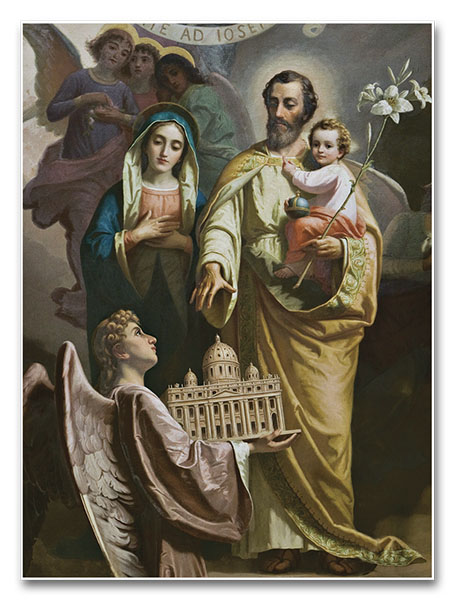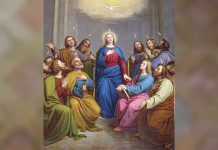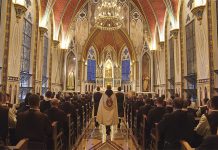It falls to St. Joseph to restore sanctity in all its splendour in the Church and society. If he is the Patriarch and Father of the Mystical Body of Christ, how can we not expect his help, with a decisiveness that increases with necessity?
Over the centuries, the Lord “has shown strength with His arm” (Lk 1:51) against His enemies, sending providential men and women who have saved His people by means of admirable feats, in which the supernatural factor has always been decisive. Nevertheless, in many circumstances, the action of divine omnipotence was preceded by a long wait, to the point that the Psalmist exclaimed: “Rouse thyself! Why sleepest Thou, O Lord? Awake! Do not cast us off for ever!” (Ps 44:23). And when all seemed lost, the intervention came in a surprising way, surpassing all expectations.
 A similar mystery occurs with St. Joseph. Although endowed with every form of heroism and audacity to defend Jesus, seldom was he able to display these virtues in their manifold aspects, since, faced with the plan of Redemption, he had to accept with obedience and resignation the divine plan for the Saviour’s death. He, as it were, spiritually immolated His Son, consenting to His holocaust so that the Father’s will might be accomplished. For this reason, the aforementioned qualities remained somewhat hidden during his life, for had he put them to full use, he would have prevented the Passion.
A similar mystery occurs with St. Joseph. Although endowed with every form of heroism and audacity to defend Jesus, seldom was he able to display these virtues in their manifold aspects, since, faced with the plan of Redemption, he had to accept with obedience and resignation the divine plan for the Saviour’s death. He, as it were, spiritually immolated His Son, consenting to His holocaust so that the Father’s will might be accomplished. For this reason, the aforementioned qualities remained somewhat hidden during his life, for had he put them to full use, he would have prevented the Passion.
Since his entrance into Heaven, however, the veils of obscurity that concealed his strength from human eyes have been removed, revealing progressively, from eternity, the strength of God’s arm through the Holy Patriarch’s increasingly clear and decisive intervention in events.
In fact, as the greatest of the holy men of history, St. Joseph enjoys, in beatitude, an altogether special audience and great intercessory power on behalf of those who have recourse to him. Through his close link with the Mystical Body of Christ, he watches over all its members, protecting the innocent and obtaining repentance for sinners. He exercises this authentic mediation in the order of grace with generosity, efficacy and dominion, meriting as no other the title of Patriarch of the Catholic Church.
Patriarch and Father
When Holy Scripture calls someone a patriarch, it seems to want to unite the prerogatives of father and the grandeur of monarch in one and the same person. Like Adam, Noah, Abraham, Isaac and Jacob, the patriarch is, before all else, the first in a numerous lineage. To his children, he represents the divine fatherhood itself, for he is capable of devoting himself entirely to them in order to save them, just as Noah devoted his life to building the ark and preserving, amid the purifying waters of the flood, the life of God’s chosen ones.

Now, St. Joseph has been officially declared Patriarch and Patron of the Holy Church,1 a title that contains a profound significance, not yet revealed to the eyes of all men. In fact, his paternity began when, by consenting to the conception of the Son of God in Mary’s womb, he received Jesus as his own Son, and was further exalted by the divine mandate to give the Child His name. This bond with the Word Incarnate places him in a very close relationship with the Church, since, by the fact that he is the father of Christ, St. Joseph is also the father of His Mystical Body, since the Head is inseparable from the members.2
For this reason, he applies the most intense fatherly devotion and care to each of the baptized, interceding continually that the breath of the Holy Spirit may vivify them and lead them to perfection. Moreover, as a good father, he cares for the needs of all, corrects their defects and sins, and defends them from their enemies, especially the devil and his snares.
It should also be added that the Patriarch is not only mediator but also archetype of the family he governs. The Apostle presented Abraham as an example of a man of faith, worthy of imitation (cf. Heb 11:8-13). Unfathomably above him stands St. Joseph, who, as Dr. Plinio observes, is “the Patriarch of the society par excellence, the Holy Roman Catholic Church, and the model of that society. If we wanted to find a man of whom we could say ‘here is the perfect Roman and Apostolic Catholic,’ it would be St. Joseph. If we saw him with his back to us, walking, we would kneel down and exclaim: ‘There is the Catholic.’ All the splendour, all the holiness, all the beauty of the Church; the wonder of all the Saints that have ever been, are and will be are symbolized in St. Joseph. Otherwise, he would not have the necessary stature to be the Patron of the Catholic Church.”3
By the same token, it can safely be said that when the Church needed special help in the face of difficulties and persecutions, her Holy Patriarch was there as a powerful intercessor and incomparable protector, communicating an indomitable courage to the soldiers of the Faith, so that they might overcome themselves and defeat the adversaries of his Son Jesus Christ.4
The history of a discreet but efficacious presence

Abbey of Monte Oliveto Maggiore (Italy)
A brief review of the history of the Church in the light of St. Joseph’s protection, sometimes discreet but always effective, will help us not only to understand all the good he has done, but also to foresee what he will yet accomplish in the glorious future reserved for those who wait to behold the manifestation of the Lord’s power.
In the first centuries, under the cruel persecution of the Roman Empire, the Church, like Our Lord Jesus Christ after His birth, developed like a frail child, continually threatened. Countless martyrs shed their blood like Jesus, not without invoking the Patriarch of the Just, whose devotion was already spreading. The patron of a good death accompanied them to their last breath, inspiring them with acts of faith, hope and charity.
As he gazed upon the inert bodies of his beloved children, St. Joseph must have pleaded for God’s intervention, as Revelation recounts: “When he opened the fifth seal, I saw under the altar the souls of those who had been slain for the word of God and for the witness they had borne; they cried out with a loud voice, ‘O Sovereign Lord, holy and true, how long before Thou wilt judge and avenge our blood on those who dwell upon the earth?’” (6:9-10).
After the persecutions ceased with the decree of Constantine, St. Joseph stood at the side of the confessors, as they defended the purity of the Faith against the innumerable and pernicious errors that attempted to distort it. On account of his absolute integrity, St. Joseph became the most implacable enemy of heresy. He watched with indignation as the numerous apostasies rent the seamless tunic of the Ruler of all time, who tolerated them in expectation of a future vengeance.
This came about, to a certain extent, with the flowering of Christian Civilization, a time of great pardon for sinful humanity, when God showed His benevolence to Catholic nations by raising up virtuous priests and kings; a time when the adorable Blood of Jesus Christ succeeded in imbuing social life with the good odour of sanctity.

During the Middle Ages, St. Joseph’s power supported the monks, giving them the spirit and wisdom to build a new civilization on the ruins of the Roman Empire, to the harmonious strains of Gregorian chant and the sweet yoke of the Benedictine rule. He accompanied the long journeys of penitent pilgrims; he clothed the crusaders with valour, and he sustained the royalty, which had in St. Henry, St. Louis and St. Ferdinand, among many others, illustrious models of combativeness against evil and zeal to establish the justice of the Gospel in all human institutions.
As the end of that period drew near, theology began to reflect with interest on St. Joseph, making him shine, albeit still faintly, in the firmament of Catholic piety. Thus was born a devotion that would spread progressively, although it did not always succeed in encompassing all the virtues of the Holy Patriarch as a harmonious whole. For example, it is not unusual to think that compassion excludes justice and, at times, St. Joseph has been considered only for one or another aspect of his great personality.
During the decline of the Middle Ages, the gnawing worm of pride and sensuality undermined the splendid edifice built by the Church, and society was carried away by practical atheism, falling into an ever greater indifference toward the supernatural world. Nevertheless, earthly joys did not satisfy men’s desires, and wars and revolutions ensued. St. Joseph’s action in this phase surely consisted in promoting devotion to the Heart of his most Sacred Son, as a salutary remedy. However, the flames of this Heart, which should have enkindled souls, were almost extinguished by the waves of materialism and vanity.
In the nineteenth century, the fervour of Catholics for St. Joseph grew throughout the world. There arose confraternities, devotions and authors of good faith who wrote a great deal about him, providing a promising broadening of the horizons of Faith regarding the Holy Patriarch, still insufficiently understood and loved. Those were times that would be followed by great calamities in the religious, moral and social fields, and St. Joseph’s patronage would help the good in the battles they would have to fight in defence of order.
In 1917, during Our Lady’s last apparition at Fatima, St. Joseph was seen with the Child Jesus on his left arm and, together with Him, blessing the crowd three times. The Blessed Virgin did not want to miss the occasion to project the figure of her spouse as one of the protagonists of the future events that would lead mankind, in the midst of tremendous tragedies, to the Reign that She promised. St. Joseph will be the precursor of Mary, who will prepare hearts so as to establish this era of peace and grace, and will reign with Her and their Divine Son in all hearts.
At the present moment
To St. Joseph were entrusted Jesus and Mary, the first fruits of the Church, in a world immersed in a deep crisis. The people of the Covenant were steeped in mediocrity and awaited a political Messiah who would raise their standard of living, exempt them from taxation and give them dominion over the world. At the same time, the other nations were immersed in the darkness of paganism, accustomed to a degrading brutality. Now, in the hands of the Holy Patriarch was the Infant Jesus, whose mission was to save men and reverse this situation by founding the Holy Catholic Church.

Sacred Heart of Jesus Church, Rome
The present moment calls for an ever clearer manifestation of the power of St. Joseph’s intervention, for it is not very different from the situation of decadence that characterized humanity when Our Lord Jesus Christ became incarnate. But the current situation is further aggravated by humanity having turned its back on the fruits of His most precious Blood, with all that this signifies, as the Apostle says in the Epistle to the Hebrews: “they then commit apostasy, since they crucify the Son of God on their own account and hold Him up to contempt” (6:6).
The whole earth is succumbing to a new paganism, worse than the previous one, where crimes of a violence that cries out to Heaven are committed: the innocence of those children who are not murdered in their mothers’ wombs is being destroyed at the earliest possible age; amorality reigns in most hearts; injustice, atheism and pragmatism dominate almost all laws and customs; in short, the world has, so to speak, touched the deepest abyss of vileness.
For this reason, devotion to St. Joseph, as Patriarch and Father of the Church, must take pride of place in Catholic piety. His intervention is becoming ever more urgent, since it falls to him to restore sanctity in all its splendour in the Church and in society. If he is the true defender of the Bride of Christ, how can we not expect his help, all the more decisive as it is necessary? Let us trust in his paternal providence and omnipotent intercession5 in favour of the Mystical Body of His Son Jesus.
His loving protection is also an authentic guarantee of the final triumph of Holy Church, announced by the prophet: “Let us rejoice and exult and give Him the glory, for the marriage of the Lamb has come, and his Bride has made herself ready” (Rv 19:7). ◊
Taken, with slight adaptations, from:
São José: quem o conhece?… [St. Joseph: Who Knows Him? …]
São Paulo: Lumen Sapientiæ, 2017, p.409-422
Notes
1 Cf. BENEDICT XIV. De servorum Dei beatificatione et beatorum canonizatione. L.IV, p.2, c.20, n.57. In: Opera Omnia. Prati: Aldina, 1841, t.IV, p.598; SACRED CONGREGATION OF RITES. Decreto Quemadmodum Deus; PIUS IX. Inclytum Patriarcham.
2 Fr. Bover explains this sublime connection: “Just as the spiritual motherhood of Mary in relation to all men is but the complement and prolongation of the natural motherhood of Jesus, so the fatherhood of St. Joseph, which he exercised naturally in relation to Christ, is prolonged in a mystical way. It is therefore necessary that the authority and paternal care which St. Joseph exercised in the Holy Family, the first nucleus of the Church, be marvellously extended to the whole Church” (BOVER, SJ, José Maria. De cultu S. Ioseph amplificando. Theologica disquisitio. Barcinone: Eugenius Subirana, 1926, p.49-50).
3 CORRÊA DE OLIVEIRA, Plinio. Conference. São Paulo, March 18, 1977.
4 Fr. Llamera, based on the teaching of the Angelic Doctor that “no beatified intellect fails to know in the Word whatever pertains to itself” (ST. THOMAS AQUINAS. Summa Theologæ. III, q.10, a.2), concludes regarding St. Joseph: “The perfection of each of the Blessed has to do with all that he acquired by charity and by various merits, especially those acquired in his particular ministries and offices while he lived on earth. Considering, then, on the one hand, the very high degree of charity of St. Joseph and, on the other, his unique ministry, there follows the affirmation of his universal patronage. Universal, certainly, first, by the faculty of assisting men in all their needs, both spiritual and material; second, by the extension of his protection and exemplary example to all people, of whatever state, class and social position they may be” (LLAMERA, OP, Bonifacio. Teología de San José. Madrid: BAC, 1953, p.316).
5 Pope Pius XI qualifies the providence and intercession of St. Joseph in the following terms: “Let us say omnipotent intercession, for that is what should be said. It may be observed that this word ‘omnipotent’ applies to the intercession of the Most Blessed Virgin. But we make bold to affirm that it is first of all necessary to apply it to St. Joseph. […] This intercession cannot be less than omnipotent, for what could be denied to St. Joseph by Jesus and Mary, to whom he dedicated literally his entire life, and to whom they truly owed the means of their earthly subsistence? (PIUS XI. Allocution, 19/3/1938).







